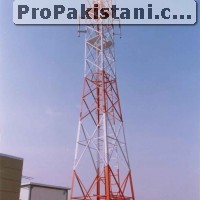As we are nearing (entering) summer, the power crisis in the country has started hitting its highest possible limits. Already, more than 10 hours in cities and 12 plus hours power cut in rural areas has badly damaged business operations. Nature of my blog confines me not to cover details of this power cut, however I will mainly discuss tower sharing concept, and how it can reduce worst financial impacts that power outage is leaving on telecom and IT like any other business domain.
There is no doubt that operating expenses of telecom companies have increased with this long power outage schedules. Like so many other telecom analysts, Babar Bhatti has also raised his voice over the crucial time that our Telecom sector is going through, due to various reasons, mainly the low ARPU (Average Revenue Per User) and increasingly saturation level in telecom.
With increasing competition, decaying service prices, investment pressure for 3G rollout, emergence of new players and growing operational expenses, power shortage in the country has fanned the fire in shaking telecom investors. An immediate and effective re-evaluation of business strategy should be carried out in order to lessen the effects of this dilemma.
With considerable geographic spread and a populous rural track, telecom companies are working vigorously to expand their network reach to far flung areas of the country. The current business scenario, where the rise in cost of primary and uninterrupted power supply has amplified enormously telecom companies must tie their hands together to share their infrastructure to minimize the expenses.
Power outage causes extra labor cost to telecom companies, who replace and manage alternate power for telecom equipment. There are also reports from various parts of the country regarding the network downtime as well; ultimately affecting the revenues.
Estimates, suggest that there are more than twenty thousand telecom towers in he country that worth millions of dollars. Market study predicts that at least twenty percent telecom towers are erected with no competitor’s presence. These 20 percent of twenty thousand towers can be shared amongst the cellular operators.
Telecom infrastructure sharing can not only shave the fat off an operator’s capex but also opex costs as well, can be vital in coming days. All operators’ under the umbrella of government must unite to gain the benefits of network sharing.
Government (Pakistan Telecommunication Authority) should peruse into possibilities where telecom companies start sharing their infrastructure. We have seen in India where government has made it mandatory for telecom operators to share their passive infrastructure such as towers to lower cost of offering services, also they have approved for telecom operators to share active tower infrastructure.
In India, operators can share towers, shelters, cooling systems, AC and DC power supply, diesel generators, air conditioning, site leases and other electrical and civil works, electronic components such as antennas, feeder cables, nodes, radio access network, transmission systems and backhaul.
Cellular operators including Airtel, Idea Cellular, Reliance Communication and Aircel are sharing their infrastructure. Vodafone has also announced a sharing agreement with Airtel.
“Guidelines for Lease / Rental / Sale of Infrastructure/ Telecommunication Tower” from PTA allow the telecom service providers to share their towers with competitors’. It says
An Infrastructure/ Telecommunication Tower Provider may share the use of equipment with another Infrastructure/ Telecommunication Tower Provider for leasing or renting to their respective customer Operators.
However, by just introducing a clause is not enough; effective measures are required from PTA to make it compulsory for telecom operators to share their network infrastructure in an organized manner.
Another approach that can be followed is, by setting up an independent towering company that may offer towering services for multiple cellular companies. Indus Telecom is one of such example, which is joint venture of Vodafone Essar, Bharti Infratel Limited and Idea Cellular Limited.